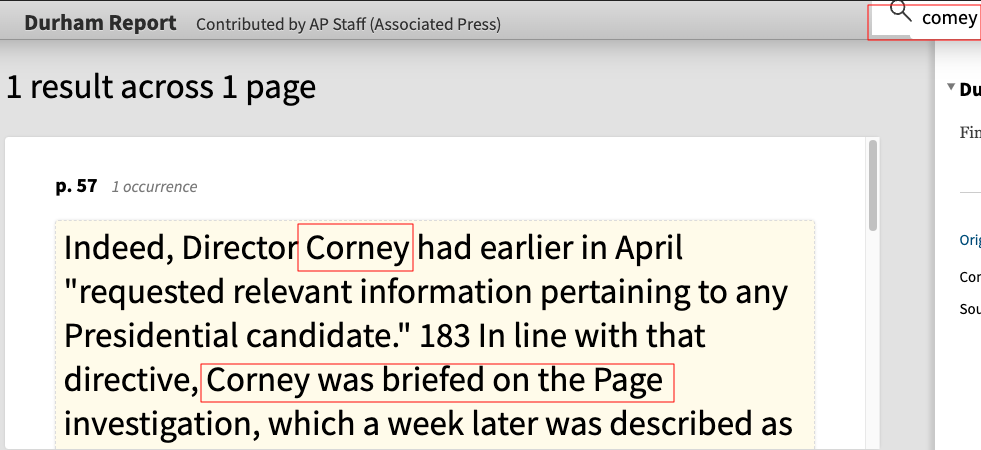It looks like you're using an Ad Blocker.
Please white-list or disable AboveTopSecret.com in your ad-blocking tool.
Thank you.
Some features of ATS will be disabled while you continue to use an ad-blocker.
share:
You Don't Say
1044
The internet’s memory is fading in front of us. Preserve what you can
1044
1044
06-Apr-2018 3:22:28 PM EDT
Q !xowAT4Z3VQ
8ch/qresearch
>>922142
Fake pic push by MSM.
Videos / backup.
Google kill.
YouTube kill.
FB kill.
Twitter kill.
Yahoo kill.
Bing kill.
Instagram kill.
Net will be paused.
HAMMER.
On the clock.
Q
The internet’s memory is fading in front of us. Preserve what you can
Preserve your digital history
The lesson? Don’t just wait for the worst-case scenario. Preserve those fragments of your digital life that really matter to you. If you’re not exactly sure where to start, here are a few suggestions.
1. Save bits of the web: If you’ve landed on a website with an image you’d like to hang on to, right-click it — or long-press, if you’re using your phone — and save it. (Since not all websites allow this, you may need to take a screenshot instead.)
If preserving individual webpages is more your concern, there are some easy options: On your computer, you could save the page as a PDF, or use a browser extension such as SingleFile to produce a near-perfect copy you can view in Chrome, Firefox, and Safari. And if you’re trying save full versions of entire websites, tools like WAIL and ArchiveBox can help — they’re not for the faint of heart, but their results would make an internet preservationist proud.
2. Back up your devices: Between messages, photos, documents, emails, and downloads, gadgets like your smartphone and tablet contain loads of information you’ll probably want to hang on to. We’ve made some quick visual guides for backing up most of this data — you can find them here.
3. Don’t just rely on the cloud: Sure, Apple and Google probably aren’t in danger of imminent collapse. But that doesn’t mean you should trust your personal content to live on in just one place. It’s much better to embrace redundancies, so keep any important files or documents in the cloud and locally, say, on an external drive you can safely store at home.
4. Download those tweets: It’s not entirely clear when — or even if — Twitter will really start deleting people’s old, unused profiles. If the idea of someone’s profile vanishing fills you with dread, there are steps you can take to make sure those tweets and images continue to live on somewhere.
5. Archive voice mails: There are a few ways to do this, like exporting high-quality audio files from your smartphone, or recording from a more basic phone with a speaker feature and computer with a microphone. Either way, don’t let the sound of someone’s voice disappear before you’re ready.
a reply to: MetalThunder
I know for a fact a lot of material I used to access in the 1990s is no longer there. In some cases, archive.org still has a copy.
And it wasn't conspiracy-oriented information. I can imagine the really touchy material is long scrubbed.
Cheers
I know for a fact a lot of material I used to access in the 1990s is no longer there. In some cases, archive.org still has a copy.
And it wasn't conspiracy-oriented information. I can imagine the really touchy material is long scrubbed.
Cheers
STORM (+Q55?) TODAY???
This decode by Arya's list makes a lot of sense to me:

Bigger
Why does it make sense? Think MIRROR and #1415 NowC@mesTHEP@in—-23!!! (partial):
MIRROR of YESTERDAY = TOMORROW...
They thought it was coming TOMORROW (= Friday for Q55 storm tweet)... Instead it comes a day early = TODAY.
So we need to "Follow the pen."; which is either a Trump E.O. or Catherine Herridge tweet account?
This decode by Arya's list makes a lot of sense to me:

Bigger
Why does it make sense? Think MIRROR and #1415 NowC@mesTHEP@in—-23!!! (partial):
...
They thought it was coming yesterday.
They were wrong.
Follow the pen.
Q
MIRROR of YESTERDAY = TOMORROW...
They thought it was coming TOMORROW (= Friday for Q55 storm tweet)... Instead it comes a day early = TODAY.
So we need to "Follow the pen."; which is either a Trump E.O. or Catherine Herridge tweet account?
Today will be an interesting day. We have the State B.A.R. disciplinary hearing for Lin Wood. It's odd that a man with not one complaint in such a
long and prestigious career is in the State crosshairs. I believe that he is a real threat to "the club" and is hot on their tail.. I mean tale. A
tall one at that.
They seem to be very interested in seeing all his electronic devices, especially his iCloud account. I wonder what it is that he has on there that has the State so curious? Let's not forget that President Trump asked him to do him a favor back on 3.11 of 2020.
While we are on the subject, it really does seem like the enemy from within is squaring off. I see things shaping up and it truly seems like there are more amongst us that are pretending to be good than not. I know I might have an unpopular opinion around here on the subject, but I seem to be making a lot of folks mad these days. Oh well.
It really does look like it's shaping up that Flynn vs Lin wasn't just for show. I know that Lin and Musk have been at odds as well. It blows my mind how people don't see how the media and everyone has come after Lin Wood, just as they did with Donald J. Trump.
With so many fakes running around with AI, it's hard to tell who is real and who is fake? I am curious as to how this will all play out. I have a feeling that no matter what the B.A.R. decides to do today, it is going to backfire and blow up in their face.
No I'm just trying to figure out how all this ties together with Musk and the X. X marks the spot. Now, let me see where I put that laser pointer
They seem to be very interested in seeing all his electronic devices, especially his iCloud account. I wonder what it is that he has on there that has the State so curious? Let's not forget that President Trump asked him to do him a favor back on 3.11 of 2020.
While we are on the subject, it really does seem like the enemy from within is squaring off. I see things shaping up and it truly seems like there are more amongst us that are pretending to be good than not. I know I might have an unpopular opinion around here on the subject, but I seem to be making a lot of folks mad these days. Oh well.
It really does look like it's shaping up that Flynn vs Lin wasn't just for show. I know that Lin and Musk have been at odds as well. It blows my mind how people don't see how the media and everyone has come after Lin Wood, just as they did with Donald J. Trump.
With so many fakes running around with AI, it's hard to tell who is real and who is fake? I am curious as to how this will all play out. I have a feeling that no matter what the B.A.R. decides to do today, it is going to backfire and blow up in their face.
No I'm just trying to figure out how all this ties together with Musk and the X. X marks the spot. Now, let me see where I put that laser pointer
a reply to: BioavAilabilityGuy
Lin should demand the hearing take place among the ruins of the Georgia Guidestones
Cheers
Lin should demand the hearing take place among the ruins of the Georgia Guidestones
Cheers
a reply to: RelSciHistItSufi
Q-2023
and today:
Oh look who's trying to revoke Whistleblowers Protections.
Q-2020
And the hearing involves FBI Whistleblowers.
Neat, isn't it. Now I wonder why Weissman would want to revoke these FBI agents protection under the Whistleblower Act?
Q-2023
Q !!mG7VJxZNCI ID: ac4acf No.2809359 📁
Aug 30 2018 20:39:16 (EST)
Anonymous ID: 2a04a3 No.2809340 📁
Aug 30 2018 20:38:42 (EST)
On fox now,
Ohr kept Weissman in the loop on dossier.
Weissman is Meuller’s bulldog.
>>2809340
BIG!
Q
and today:
Oh look who's trying to revoke Whistleblowers Protections.
Q-2020
Q !!mG7VJxZNCI ID: 564cef No.2806823 📁
Aug 30 2018 18:56:13 (EST)
Anonymous ID: 11b426 No.2806653 📁
Aug 30 2018 18:49:58 (EST)
>>2806559
Please just keep POTUS safe, Q.
>>2806653
We will gladly end our lives to ensure he lives.
More than you can imagine.
Q
And the hearing involves FBI Whistleblowers.
Neat, isn't it. Now I wonder why Weissman would want to revoke these FBI agents protection under the Whistleblower Act?
Ripple Rolls Out CBDC Platform for Governments, Financial Institutions
www.decrypt.co...=1
Zimbabwe Sells $39M Gold-Backed Tokens, Defying IMF Warning
www.cryptotimes.io...
Hunan Province, China, Debuts Digital Yuan Loans for Small Businesses – Another CBDC First?
cryptonews.com...
Ripple is rolling out a proprietary platform for central bank digital currencies (CBDCs), enabling central banks, governments, and financial institutions to create their own digital currencies
Described as “a frictionless end-to-end solution,” the Ripple CBDC Platform builds on Ripple's Private Ledger, which was first introduced in 2021 for CBDC issuance. It's based on the same blockchain technology as the XRP Ledger (XRPL), which was also designed primarily for payments.
As a trusted partner to several central banks, we believe this platform will help solve problems for many central banks and governments who are devising plans and developing a technology strategy for CBDC Implementations,” said Ripple's vice president of CBDCs James Wallis.
Wallis added that the platform’s innovative capabilities “will help enable instant settlement of both domestic and cross-border payments, reduce risk, and improve the user experience of quickly sending and receiving digital currency on either side of a transaction.”
www.decrypt.co...=1
Zimbabwe Sells $39M Gold-Backed Tokens, Defying IMF Warning
Despite a warning from the International Monetary Fund (IMF), the Reserve Bank of Zimbabwe has successfully sold 14 billion Zimbabwean dollars’ worth of gold-backed digital tokens, equivalent to approximately $39 million. The central bank announced that it received 135 applications, totaling 14.07 billion Zimbabwean dollars, for the purchase of the gold-backed cryptocurrency.
The success of this initial sale has prompted the central bank to announce a second round of digital token sales. Applications are requested to be submitted this week for settlement by May 18. Dr. John Mangudya, the Governor of the Reserve Bank of Zimbabwe, emphasize on local channel that, the issuance of gold-backed digital tokens aims to expand the available value-preserving instruments in the economy and enhance the public’s access to and use of investment products by increasing their divisibility.
www.cryptotimes.io...
Hunan Province, China, Debuts Digital Yuan Loans for Small Businesses – Another CBDC First?
Hunan Province, China, has debuted new digital yuan loans for tech startups – with Beijing keen to explore more central bank digital currency (CBDC) financing options.
Per the Changsha Evening News, via JDZ, three startup founders became the first people to be awarded CBDC loans from the state-owned Bank of Communications.
In a first for the Bank of Communications and the province, around $87,000 in digital yuan tokens was granted as loans on May 12.
cryptonews.com...
Home Depot sees first annual sales decline in more than a decade as housing streak ebbs, rates jump
apnews.com...
twitter.com...
The Big Squeeze: The housing market is so unaffordable that builders have no choice but to build smaller homes
fortune.com...
After years of explosive growth during the pandemic, Home Depot’s revenue during the first quarter fell short of expectations and the company cut its profit and sales outlook for the year, sending shares lower at the opening bell.
Home Depot on Tuesday projected its first decline in annual revenue since 2009 in the aftermath of the bursting of the housing bubble and financial crisis.
apnews.com...
Home Depot $HD is a far bigger story than the debt ceiling
twitter.com...
The Big Squeeze: The housing market is so unaffordable that builders have no choice but to build smaller homes
The Pandemic Housing Boom, which pushed national home prices up over 40%, coupled with last year’s mortgage rate shock, has resulted in a deterioration of housing affordability.
Fundamentally, every major housing market in the country is overpriced right now,” Matt Saunders, senior vice president of building products research at John Burns Research and Consulting, told Fortune, adding that this is generally true if you’re looking at it from a housing-cost-to-income ratio.
In order to address the affordability crunch, many builders are reducing home size.
“There’s really this active response by the builders to address these affordability concerns head-on, and one of the main kind of levers that they’re pulling is reducing home square footage,” Saunders said.
fortune.com...
Wall Street Fears $1 Trillion Aftershock From Debt Deal
www.bloomberg.com...
Powell May Hang The Market Out To Dry Come Friday
seekingalpha.com...
US Government May Freeze American Bank Withdrawals As Currency Panic and Capital Flight Mounts: Macro Guru Hugh Hendry
dailyhodl.com... endry/
Looming behind market fears over the prospect of a historic US default is the less-discussed risk of what would follow a deal to resolve the debt-ceiling impasse.
Many on Wall Street predict lawmakers will ultimately reach an agreement, likely averting a devastating debt default, even if it goes down to the wire. But that doesn’t mean the economy will escape unscathed, not just from the bruising standoff but also as a result of the Treasury’s efforts to return to business as usual once it can ramp up borrowing.
www.bloomberg.com...
Powell May Hang The Market Out To Dry Come Friday
Given the narrow trading range observed in the past few days, the markets may overlook this. However, it's worth noting that Jay Powell is scheduled to speak on Friday, May 19, at 11 a.m. This will be Powell's first opportunity to address the public since the May FOMC meeting. While many investors still believe that the May FOMC meeting marked the Fed's final interest rate hike, it's unlikely that Powell will explicitly mention the word "pause."
seekingalpha.com...
US Government May Freeze American Bank Withdrawals As Currency Panic and Capital Flight Mounts: Macro Guru Hugh Hendry
There is capital flight, deposit flight from the banking sector seeking yield. I fear that, I don’t say this lightly, but in 1934 the Federal Reserve Act confiscated gold from US citizens.
We’re at the point where the Fed and Treasury officials I’m sure are having to consider a gate a lock on US bank deposits.”
dailyhodl.com... endry/
The Race Intensfies: Google Announces Bold Progress In AI, Advancing Med-PaLM 2 For Healthcare
www.forbes.com...
Robots are going to start pushing woke propaganda on BuzzFeed properties:
Buzzfeed Inc. (owners of Complex, HuffPost, Tasty, etc) tells investors that AI will generate content, headlines, "infinite quizzes" & develop Black, Asian, Latino identity-based content to help corporate brands tap an "authentic voice" to sell products
Transcript here
OpenAI chief concerned about AI being used to compromise elections
www.reuters.com...
Elon Musk: "I am the reason OpenAI exists"
AI has been all the buzz in both Silicon Valley and around the world for the last few months, especially after the release of Chat-GPT and advanced generative AI systems. This has triggered somewhat of a frantic rat-race amongst tech giants: everyone wants a piece of the AI pie, and the race to the top is intense.
Notably, Ghahramani also discusses one of the most highly anticipated arenas of impact for AI: healthcare. He delves into Med-PaLM 2, the large language model developed specifically to generate medical insights: “trained by our health research teams with medical knowledge, [Med-PaLM 2] can answer questions and summarize insights from a variety of dense medical texts. It achieves state-of-the-art results in medical competency, and was the first large language model to perform at “expert” level on U.S. Medical Licensing Exam-style [USMLE] questions. We're now adding multimodal capabilities to synthesize information like x-rays and mammograms to one day improve patient outcomes. Med-PaLM 2 will open up to a small group of Cloud customers for feedback later this summer to identify safe, helpful use cases.”
www.forbes.com...
Med-PaLM 2 is outperforming doctors
Google's latest Med-PaLM 2 has been outperforming actual doctors.
It's a version of Googles PaLM model specifically tuned for medical use cases like reading X-rays.
Based on the MedQA test, it achieved an 86.5 rating which is higher than 70% of real physicians.
Robots are going to start pushing woke propaganda on BuzzFeed properties:
Buzzfeed Inc. (owners of Complex, HuffPost, Tasty, etc) tells investors that AI will generate content, headlines, "infinite quizzes" & develop Black, Asian, Latino identity-based content to help corporate brands tap an "authentic voice" to sell products
"In order to help [Sprite] reach a multicultural audience, the campaign ran across Complex and Hot Ones as well as BuzzFeed's Black Identity brand ... We see creators, AI and [identity/cultural] moments as intersectional."
Transcript here
OpenAI chief concerned about AI being used to compromise elections
The CEO of OpenAI, the startup behind ChatGPT, told a Senate panel on Tuesday the use of artificial intelligence to interfere with election integrity is a "significant area of concern", adding that it needs regulation.
"I am nervous about it," CEO Sam Altman said about elections and AI, adding rules and guidelines are needed
www.reuters.com...
Elon Musk: "I am the reason OpenAI exists"
a reply to: RelSciHistItSufi
Rel I loved London and hope to return again and will do the walk.
I'm just wondering if we have a link to the Keystone in #126.
Marco Polo has a thread unroll regarding Hunter Biden's laptop.
The Rosetta Stone
"There are 128K emails from the Biden laptop, which is a modern Rosetta Stone of white and blue collar crime under the patina of 'the Delaware way."
Rosetta Stone Decoding
I checked Joe Biden's secret cell phone #1=302-377-XXXX and it is for the Delaware region.
Cell phone area identifier
Maybe there is more than one keystone but as Marco Polo indicates this can be considered Open Source Intelligence Gathering.
Rel I loved London and hope to return again and will do the walk.
I'm just wondering if we have a link to the Keystone in #126.
Marco Polo has a thread unroll regarding Hunter Biden's laptop.
The Rosetta Stone
"There are 128K emails from the Biden laptop, which is a modern Rosetta Stone of white and blue collar crime under the patina of 'the Delaware way."
Rosetta Stone Decoding
I checked Joe Biden's secret cell phone #1=302-377-XXXX and it is for the Delaware region.
Cell phone area identifier
Maybe there is more than one keystone but as Marco Polo indicates this can be considered Open Source Intelligence Gathering.
a reply to: FlyingFox
Now words from our sponsor of the day The American Cancer Society...
We just have soo many 11's at the moment.
Now they acknowledge that maybe those jabs were not so safe and effective for people with cancer.
American Cancer Society
No q about it Pfizer needs Seagen.
Giving Pfizer a break what this about J&J...
The CDC is revoking their jabs but maybe they shouldn't be in such a rush to destroy the evidence. Just saying it might be handy to have some around for future reference.
J&J Covid Jab No Longer Available in the U.S.
Now words from our sponsor of the day The American Cancer Society...
We just have soo many 11's at the moment.
Now they acknowledge that maybe those jabs were not so safe and effective for people with cancer.
American Cancer Society
No q about it Pfizer needs Seagen.
Giving Pfizer a break what this about J&J...
The CDC is revoking their jabs but maybe they shouldn't be in such a rush to destroy the evidence. Just saying it might be handy to have some around for future reference.
J&J Covid Jab No Longer Available in the U.S.
a reply to: Guyfriday
I can't imagine what the people of New York and London must be thinking or maybe I can.
The climate mayors have decided that the consumption of red meat is just wrong, just unacceptable especially in light that Billy Gates has the lab grown meat as a backup. Or better yet zee bugs.
New York to Track Residents and Cap Meat Consumption
I had never heard of this C40 mayor group before. I checked their twitter and talk about flying under the radar.
C40 twitter
When I keyed in C40 # 2590 pops up which refers to Cardinal Pell.
Pope Francis hosted members of this mayors group in 2015 so quite obvious the plan has been worked on for quite some time.
What is your impression of Cardinal Pell? From the article he was not in favor of science mixing with religion and was a skeptic of climate change. He also doesn't seem to be a fan of Pope Francis. Is there something more that we should know about him?
Pope Francis Hosts World's Mayors
----
The Vatican appears to be mired in some more controversy. What are the chances that their new stamp for World Youth Day was advertised on May 11th ? And now they pull it. Probably there was more than a little controversy, especially when there is dictership feelz to it.
Vatican Pulls World Youth Day Stamp
I can't imagine what the people of New York and London must be thinking or maybe I can.
The climate mayors have decided that the consumption of red meat is just wrong, just unacceptable especially in light that Billy Gates has the lab grown meat as a backup. Or better yet zee bugs.
New York to Track Residents and Cap Meat Consumption
I had never heard of this C40 mayor group before. I checked their twitter and talk about flying under the radar.
C40 twitter
When I keyed in C40 # 2590 pops up which refers to Cardinal Pell.
Pope Francis hosted members of this mayors group in 2015 so quite obvious the plan has been worked on for quite some time.
What is your impression of Cardinal Pell? From the article he was not in favor of science mixing with religion and was a skeptic of climate change. He also doesn't seem to be a fan of Pope Francis. Is there something more that we should know about him?
Pope Francis Hosts World's Mayors
----
The Vatican appears to be mired in some more controversy. What are the chances that their new stamp for World Youth Day was advertised on May 11th ? And now they pull it. Probably there was more than a little controversy, especially when there is dictership feelz to it.
Vatican Pulls World Youth Day Stamp
Australian CBDC trials execute first FX transaction
www.ledgerinsights.com...
Ripple to Help Hong Kong Build CBDC: Official
u.today...
Ripple to Showcase Real Estate Asset Tokenization Solution as part of the Hong Kong Monetary Authority’s Inaugural e-HKD Pilot Programme
www.businesswire.com... tary-Authority%E2%80%99s-Inaugural-e-HKD-Pilot-Programme
ECB calls for digital ID, authentication experts to develop rules for digital euro
www.biometricupdate.com...
Yesterday, blockchain startup CANVAS announced the successful execution of its central bank digital currency (CBDC) trial in Australia, using the eAUD to test foreign exchange (FX) transactions.
Tokenized FX settlements hold significant benefits, including round-the-clock trading and instant payments. The test is part of a series of pilots conducted by the Reserve Bank of Australia and the Digital Finance Cooperative Research Center (DFCRC).
www.ledgerinsights.com...
Ripple to Help Hong Kong Build CBDC: Official
Ripple, a leading player in the crypto payments industry, has secured a prominent role in Hong Kong's e-HKD Pilot Programme. The initiative, announced by the Hong Kong Monetary Authority, aims to explore the potential use cases of the digital Hong Kong dollar (HKD) with a select group of firms from the financial, payment and technology sectors.
u.today...
Ripple to Showcase Real Estate Asset Tokenization Solution as part of the Hong Kong Monetary Authority’s Inaugural e-HKD Pilot Programme
HONG KONG & SAN FRANCISCO--(BUSINESS WIRE)--Ripple, the leader in enterprise blockchain and crypto solutions, announced today that it has been selected to showcase a real estate asset tokenization solution as part of the Hong Kong Monetary Authority’s (HKMA) inaugural e-HKD Pilot Programme.
The HKMA has adopted a three-rail approach to prepare for the possible rollouts of the e-HKD. As a leading provider offering real world asset tokenization capabilities, Ripple alongside its partners including Fubon Bank – one of the largest commercial banks in Taiwan – will demonstrate its use case under e-HKD Pilot Programme, which will focus on real estate asset tokenization and equity release leveraging the e-HKD. e-HKD Pilot Programme will see a series of pilots conducted with various industry players to gain in-depth research into application, implementation, and design issues related to the e-HKD.
www.businesswire.com... tary-Authority%E2%80%99s-Inaugural-e-HKD-Pilot-Programme
ECB calls for digital ID, authentication experts to develop rules for digital euro
The European Central Bank is inviting experts in identification and authentication to contribute to the development of rules for the digital euro.
A ‘workstream’ is being set up to establish identification and authentication requirements for the digital currency, with the goal of enabling best-in-class user experience and security. Impact assessments for various existing approaches to identification and authentication will also be carried out.
The EU’s planned digital currency is expected to be stored in the EU Digital Identity Wallet, with support for peer-to-peer transactions.
www.biometricupdate.com...
@JamesComey, still lurking? Care to comment.




Report

Q MockingBird could be seen as the CIA talking points Russia Russia Russia...

Speculated at the time this meant he was testifying.

What folks are learning, the very effing hard way, is there is NO Moral Court, NO Morality Law, and as Durham said finding legal grounds is thin, LLC's, hiding behind attorney/client, "well we never said that, we said this..., which could be true." The Steele thing makes all of this reasonable, as anyone just had to say, "Oh, I read it and 100% believed it was true, so I was just repeating, I'm shocked it wasn't true, my god, who knew?"
It is not what you know, it is what you can prove. Anons knew all of this, more or less, because of the Q drops, now the normies can live with it.
While everything done to DJT et al is immoral on every single level, we can quote Mr Comey here about the Higher Order, as in The Order Of____ which justifies any and all actions taken by the minion class, especially if they view their days as being numbered. They knew, once he came down the escalator = descending into the swamp, they were screwed.
So now folks have to decide what to do.
Dark To Light is one thing, what to do after is another. My guess, folks won't have much time to stew on it, as more is to Come(y) which will overwhelm.
DID YOU COUNT THE SPACES,..
What are the Odds That The FIRST Truth of Trump On the 17th is At 8:08am
##808
ANON:
Thank you for the confirmation,..
Did Joe Poopy His Pants? .
There is an Ascension Island





Report

Q MockingBird could be seen as the CIA talking points Russia Russia Russia...

Speculated at the time this meant he was testifying.

What folks are learning, the very effing hard way, is there is NO Moral Court, NO Morality Law, and as Durham said finding legal grounds is thin, LLC's, hiding behind attorney/client, "well we never said that, we said this..., which could be true." The Steele thing makes all of this reasonable, as anyone just had to say, "Oh, I read it and 100% believed it was true, so I was just repeating, I'm shocked it wasn't true, my god, who knew?"
It is not what you know, it is what you can prove. Anons knew all of this, more or less, because of the Q drops, now the normies can live with it.
While everything done to DJT et al is immoral on every single level, we can quote Mr Comey here about the Higher Order, as in The Order Of____ which justifies any and all actions taken by the minion class, especially if they view their days as being numbered. They knew, once he came down the escalator = descending into the swamp, they were screwed.
So now folks have to decide what to do.
Dark To Light is one thing, what to do after is another. My guess, folks won't have much time to stew on it, as more is to Come(y) which will overwhelm.
DID YOU COUNT THE SPACES,..
What are the Odds That The FIRST Truth of Trump On the 17th is At 8:08am
##808
ANON:
Thank you for the confirmation,..
Did Joe Poopy His Pants? .
There is an Ascension Island

a reply to: F2d5thCavv2
This is a very loaded comment. It could be taken more than one way. I'll give you the benefit of the doubt though. I believe when all is said and done, Lin will disperse of the remnants of the state bar in a similar fashion.
Cheers!
This is a very loaded comment. It could be taken more than one way. I'll give you the benefit of the doubt though. I believe when all is said and done, Lin will disperse of the remnants of the state bar in a similar fashion.
Cheers!
a reply to: socialmediaclown
Again, it’s not something I like to discuss publicly. I made a thread on ATS years ago about my experience and then things got even more weird. I’ve never seen numbers or even binary, yes to all your other suggestions.
Again, it’s not something I like to discuss publicly. I made a thread on ATS years ago about my experience and then things got even more weird. I’ve never seen numbers or even binary, yes to all your other suggestions.
a reply to: Thoughtful2
Food related:
CRISPR sausage gets FDA green light for consumption
www.freethink.com...=1
Mustard greens genetically tweaked to be less bitter will be the first CRISPR edited food available in the US when they reach supermarkets this summer
geneticliteracyproject.org... -in-the-us-when-they-reach-supermarkets-this-summer/
A banana that doesn’t go bad so fast approved by the Philippines
www.freethink.com...=1
Food related:
CRISPR sausage gets FDA green light for consumption
The FDA has given Washington State University (WSU) researchers the green light to feed five gene-edited pigs to people. The approval could help build public trust in CRISPR’d foods and be the first step in a new food revolution.
Now, the FDA has issued an investigational approval to researchers at WSU, giving them the green light to feed people meat from a new line of pigs, which are genetically engineered to be sterile.
www.freethink.com...=1
Mustard greens genetically tweaked to be less bitter will be the first CRISPR edited food available in the US when they reach supermarkets this summer
North Carolina–based Pairwise is rolling out a new type of mustard greens engineered to be less bitter than the original plant. The vegetable is the first Crispr-edited food to hit the US market.
geneticliteracyproject.org... -in-the-us-when-they-reach-supermarkets-this-summer/
A banana that doesn’t go bad so fast approved by the Philippines
In April of this year, the Philippines approved gene-edited bananas that ripen but do not turn brown. These bananas were engineered by UK-based biotech company Tropic Biosciences, using its proprietary gene manipulation technology.
Companies like Tropic Biosciences are now focusing on ways to limit the activity of this enzyme. Tropic did this with something called “gene editing-induced gene silencing” (GEiGS) technology. As the name suggests, it combines the power of gene editing and gene silencing.
For the editing, it relies on CRISPR technology to make precise edits to the banana DNA. For silencing, it uses RNA interference (RNAi) to reduce how active a gene is, preventing the production of its corresponding protein.
www.freethink.com...=1
A secretive annual meeting attended by the world's elite has A.I. top of the agenda
OpenAI CEO Sam Altman will join forces with key leadership from Microsoft, DeepMind and Google on Thursday as the secretive Bilderberg Meeting kick-starts.
Artificial intelligence will be a key focus of the talks between members of the business and political elite in Lisbon, Portugal.
The annual Bilderberg event is shrouded in mystery, with discussions held behind closed doors and under Chatham House rules.
What is on the agenda in 2023?
www.cnbc.com...
OpenAI CEO Sam Altman will join forces with key leadership from Microsoft, DeepMind and Google on Thursday as the secretive Bilderberg Meeting kick-starts.
Artificial intelligence will be a key focus of the talks between members of the business and political elite in Lisbon, Portugal.
The annual Bilderberg event is shrouded in mystery, with discussions held behind closed doors and under Chatham House rules.
OpenAI CEO Sam Altman will join forces with key leadership from companies like Microsoft and Google this week as a secretive meeting of the business and political elite kick-starts in Lisbon, Portugal.
Artificial intelligence will top the agenda as the ChatGPT chief meets with Microsoft CEO Satya Nadella, DeepMind head Demis Hassabis and former Google CEO Eric Schmidt at the annual Bilderberg Meeting.
The tech titans will be joined by political heavyweights including former U.S. Secretary of State Henry Kissinger, NATO Secretary-General Jens Stoltenberg and Ukrainian Foreign Minister Dmytro Kuleba for a range of discussions spanning international relations, trade, energy and finance
What is on the agenda in 2023?
A.I.
Banking system
China
Energy transition
Europe
Fiscal challenges
India
Industrial policy and trade
NATO
Russia
Transnational threats
Ukraine
U.S. leadership
www.cnbc.com...
edit on 18-5-2023 by
socialmediaclown because: (no reason given)
new topics
-
OK this is sad but very strange stuff
Paranormal Studies: 10 hours ago -
Islam And A Book Of Lies
Religion, Faith, And Theology: 11 hours ago
top topics
-
Sorry to disappoint you but...
US Political Madness: 14 hours ago, 13 flags -
OK this is sad but very strange stuff
Paranormal Studies: 10 hours ago, 7 flags -
Islam And A Book Of Lies
Religion, Faith, And Theology: 11 hours ago, 5 flags
active topics
-
Sorry to disappoint you but...
US Political Madness • 18 • : CarlLaFong -
NJ Drones tied to Tesla explosion at Trump Las vegas
General Conspiracies • 55 • : Xtrozero -
Joe Biden gives the USA's Highest Civilian Honor Award to Hillary Clinton and George Soros.
US Political Madness • 50 • : Xtrozero -
-@TH3WH17ERABB17- -Q- ---TIME TO SHOW THE WORLD--- -Part- --44--
Dissecting Disinformation • 3947 • : Crazierfox -
Here we again... CHINA having mass outbreak of something
Diseases and Pandemics • 29 • : BeyondKnowledge3 -
Matthew Livelsberger said he was being followed by FBI
Political Conspiracies • 73 • : 38181 -
Islam And A Book Of Lies
Religion, Faith, And Theology • 5 • : BeyondKnowledge3 -
OK this is sad but very strange stuff
Paranormal Studies • 4 • : chiefsmom -
Musk calls on King Charles III to dissolve Parliament over Oldham sex grooming gangs
Mainstream News • 184 • : ufoorbhunter -
Can we be certain that Jesus Christ was born on December 25th?
Religion, Faith, And Theology • 35 • : covent
